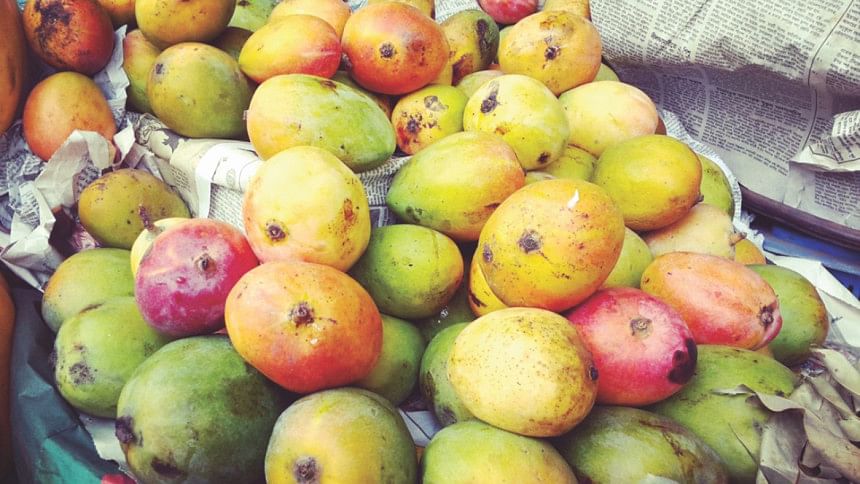Taste of Summer

Photos: Kazi Tahsin Agaz Apurbo
Summer is hot. Even countries with bitingly cold winter can have hot summer. Deserts and arid plains is naturally hot and the heat is like that of a blast furnace. There are agricultural plains where the summer heat can be searing. Summer in Bangladesh is very hot and more than that it is oppressively humid. Norwesters and rainy spell bring relief.
Yet summer is special to the common people of Bangladesh! It comes with a fruit basket bountiful in variety and luscious in its taste. The rich and the poor they all enjoy the taste of fruits that come with summer - kathal (jackfruit), tormuj (watermelon), aam (mango), lichu (litchi), jamrul (rose apple), jam (berry), gaab (sharon fruit), latkan (longan), paniphal (water chestnut) and bangi, footi etc. The basket is full and the love for fruits makes summer a festival that starts from the month of April. Nay! From the end of March. Jackfruit is the passion of the people of Bangladesh and rightly it is the national fruit.
It starts with bangi, gab and watermelon. Vendors in every corner have piles of watermelons. There was a time when the local variety of watermelon with dark green skin was on the market. It was generally grown in the sandy plains of Patenga and lasted till the early part of the seventies.
The availability of litchis has a relatively shorter duration of two months in comparison to other summer fruits. They are gone by the onset of monsoon. Generally the best of litchis arrive from Dinajpur.
Jackfruit is Bangladesh's very own fruit. Almost every home must have a taste of kanthal. It is grown in the high land of Dhaka, Mymensingh, Comilla, Sylhet and Chittagong. Canned jackfruit pouches are even available in America coming from Thailand. Jackfruit stones are put into curries to make it a delicacy. The left overs are also useful as cattle feed.
The love for mango is all over the region. Mangoes are known by different names. The best mango in Bangladesh comes from Chapainawabganj. The early varieties are mangoes from different parts of Bangladesh not exactly specializing in the fruit. The well-known items are Himsagar, Lengra and Fazli. Himsagar and Lengra are early arrivals. Fazli the largest in size is much awaited and late arrival continues through the month ofAshar and even Shrabon. The other varieties are Gopalbhog, Mohonbogh, Chausa, Farooquibhog, Neelambori, Sundari, Amrapali, Mollika, Tommy Atkins etc. Down the ages one of the favourite way of relishing mango is to have it with milk.
Summer in Bangladesh is also special because according to Bengali calendar it starts with Pohela Baishakhthe Bengali New year. It is the only festival where all communities take part with equal fervour and joy.

One of the finest spectacle of summer is an afternoon mild breeze rustling through the Krishnachura tree in full bloom with bountiful bunches of red flowers. The fascinating sight sets the hearts in love to flutter. The other flowers of summer are Naglingam, Kathgolap, Lalshonalu and Jarul and beli (Arabian Jasmine)etc.
The Buddhist community in Bangladesh observes Bouddha Purnima the greatest Buddhist festival on a full moon date of the month of Baisakh.It is known as Vesãkha derived from Pali. Bouddha Purnima is known as the birth, enlightenment and death of Lord Buddha.
Besidesthe Hindu community has a lesser religious custom in the month of Jaistha called Jamai Shoshthi. When the sons-in-laws are given importance and are sumptuously entertained. The Hindu businessmen have an age old custom of opening a new book of accounts known as Halkhataon Pohelathe Bengali New Year's day.
Summer in Bangladesh is the season of nor'westers or Kal Boisakhi. When the sun is glowering in the sky a clump of cloud starts collecting in the north western or western part of the sky, a kalboisakhi is raising its head, it spreads, gradually becoming threateningly dark and on its day it envelops the whole sky before sunset or after dusk and it strikes with wind that makes the earth to cower before it. The children would seize the opportunity to rush out and collect mangoes that fall to the blast of the wind. When the fury subsides the rain lashes. The relief has come!

 For all latest news, follow The Daily Star's Google News channel.
For all latest news, follow The Daily Star's Google News channel. 



Comments